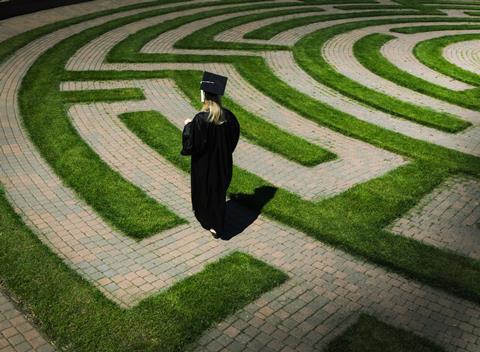Vikki Cantrill investigates the rise in education-based final-year research projects to discover the opportunities available for chemistry undergraduates
A number of universities now offer education-based research projects to chemistry students as alternatives to traditional laboratory-based research. These independent research projects typically take place during the final year of study of a batchelor’s or integrated master’s programme and account for between 20 and 60 credits (c.200–600 hours).
Education projects involve pedagogical research, developing new resources or activities for a particular curriculum outcome, or designing outreach or public engagement events. These projects are not simply teaching placements or work experience.

The school of chemistry at the University of Manchester has offered education projects to MChem students for the last two years. After the school of chemistry employed staff with a teaching focus, the idea came about to provide education projects, says Kristy Turner, a school teacher fellow in the department. The school also wanted to find alternatives to some lab-based projects because of pressures on lab space.
A similar scheme for BSc and MChem students has been running for almost 10 years in the school of chemistry at the University of Edinburgh. Michael Seery, reader in chemistry education, points out that these alternative projects are very much research and chemistry, not just an easy option. ‘Education research is a real challenge for undergraduates. They need to understand the education system. It’s a new language that they have to get to grips with’, says Michael.
The department of materials science and engineering at Sheffield has also offered projects for a number of years. A few years ago metallurgist Russell Goodall supervised a project there on developing classroom experiments involving breaking chocolate to teach material mechanical behaviour. This work was published [£], developed into an outreach activity for schools and incorporated into an undergraduate laboratory practical. Another project developed teaching resources and demonstrations for open days on ‘What is bio-engineering?’, supervised by Julian Dean, a lecturer in materials science.
Career-ready students
Education projects naturally appeal to students who are considering a career in teaching, but they are also important to support a breadth of student outcomes by helping them to develop transferable skills before they graduate. After all, more than 45% of chemistry graduates leave science early in their careers.
Students that do education projects develop a range of transferable and professional skills sought by employers. Good communication skills are essential because projects often involve getting to know a variety of people and corresponding with them outside of a university setting.
Importantly, the same criteria are used to assess both laboratory and education projects. All projects need to be based on the academic literature and go through a research cycle: research, design/development, implementation and evaluation. For education projects, ‘the literature reviews give an opportunity to consider the science or engineering behind the project and also school curricula, learning methods and, where applicable, market research’, says Dan Allwood, professor in materials physics at Sheffield.
The decision to do an education project should not be taken lightly by students. The choice ‘has to be a conscious decision by the students that a lab-based career isn’t for them’, says Michael. Currently, it is fairly easy for a lab-project student to progress into teaching or education, but it is likely harder for an education-project student to go on to further study within a research laboratory environment. However, Jacquie Robson, associate professor in teaching at Durham University, adds that it depends on the skills of the student and that doing an education project ‘is not closing the door to chemistry’. After completing an education project that required a lot of data handling and analysis, one of Jacquie’s students enrolled onto a physical chemistry PhD programme.
A growing offering?
The universities of East Anglia, Edinburgh, Leeds, Manchester, Sheffield, Southampton, Durham and Keele are some of the higher education institutions (HEIs) that routinely offer education projects. For HEIs that wish to set up a similar scheme, ‘there really needs to be dedicated teaching and scholarship staff available’, says Kristy.
Education projects require a certain time commitment from staff – perhaps two hours per student every week – because students need to be closely monitored and the workload cannot be delegated to senior members of associated research groups.
‘Over the past 10 years, there has been a move by universities to recruit more people into teaching focused roles’, says Michael. Increasingly, these staff are teaching specialists who focus on pedagogy, and influence the direction of the curriculum, policy and assessments. More positions are expected in light of the Teaching Excellence and Student Outcomes Framework and as universities start to provide a clear career track for teaching-focused employees.
Projects that develop teaching resources also lead to links between universities, schools and the local community. ‘If we want teachers to engage with subjects like ours and raise awareness with their students, we get the greatest effect by providing them with tools that make their lives easier’, says Russell. Community links can be particularly important in areas with low rates of participation in higher education (HE) because they support widening participation.
Course accreditation
There is a misconception that education projects will affect the Royal Society of Chemistry (RSC) accreditation status of an HEI. RSC accreditation criteria state that a number of different types of project, which include computational and theoretical chemistry or chemical pedagogy, are permitted. External examiners are also supportive of education projects.
‘Programmes must incorporate some independent investigative methodology and the activities should require students to apply information that they have learned to consolidate and extend their knowledge and understanding of chemistry’, explains Toby Underwood, manager for accreditation and careers at the RSC. ‘External placements offer the possibility to develop professional skills, work on project management skills, and use transferable and communication skills.’ For a BSc programme, a suitable project can include a small independent project – perhaps to prepare a new resource – alongside a teaching placement, whereas for an integrated Master’s programme RSC accreditors expect an investigative and detailed piece of research into a particular area.

Five minutes with Jordanna Richardson
Where are you studying?
I’m in the final year of a four-year MChem degree at the University of Manchester.
Why did you choose to do an education research project?
I already knew I didn’t want a lab job. So a project outside the lab really appealed to me. I have definitely enjoyed it. It has been very full on!
My project was about how teaching resources are used in chemistry classrooms. My work was based on the RSC Starters for Ten resource. I wanted to find out how they are used and what sorts of resources teachers want.
Would you recommend an education project?
Yes. My project allowed me to apply my knowledge. It has given me some real life experiences that can be applied to the work place.
There are so many aspects to an education-based project. I have had a chance to develop my skill set. I have spoken directly to teachers, sent emails, made phone calls, done observations and designed surveys. The project has required professionalism and problem solving.
I have been so well supported. I had a lot of close contact with my supervisor. There were five of us and we all met up and helped each other out.
Vikki Cantrill is a freelance writer and editor based in Cambridge, UK and tweets @Vikki_Cantrill














1 Reader's comment